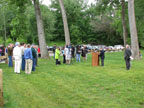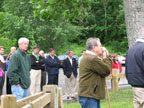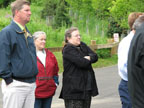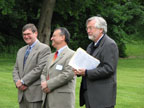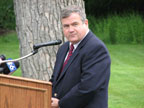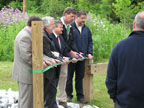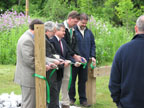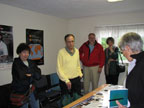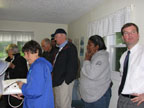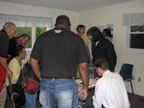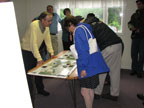- From MassLand Weekly E-News
- NEW HANDBOOK DEMYSTIFIES TRANSPORTATION FOR CONSERVATION ADVOCATES
- Environmental Grants Deadlines Approaching
- Berkshire County River Cleanups
- Rededication Ceremony for Fred Garner Park
- Urban River Visions plan for the West Branch of the Housatonic River Unveiling
- Philip Giudice New State Commissioner of Energy Resources
- Sierra Club is Hiring in Boston
- MA Environment Committee Hearing Schedule
From: MassLand Weekly E-News
SENATE PASSES BUDGET – NOT SO GOOD FOR ENVIRONMENT
– by Nancy Goodman, Vice President for Policy, Environmental League of Massachusetts
On Wednesday, the Senate was in session until 9:30 pm considering hundreds of budget amendments. Initially, they took amendments in order and considered them individually. However, just before getting to the environmental amendments, they recessed and when they returned, they voted to adopt a "yes" pile and to deny a "no" pile, which included hundreds of amendments dealing with all agencies. As we waited for the Senators to file out, no one could tell us which of our priorities had been included or not.
Talking with Senators and staff earlier that day, it was clear that the Senate was trying to hold the line on amendments and when the results of their deliberations became available yesterday, the news was not good. They increased the bottom line for environmental agencies by $4.78 million, but many of our priorities were not included. There was no increased funding for state or urban parks although state beaches did see an increase of $2.3 million, matching the House figure. And there was no increased funding for MassGIS or the Natural Heritage Program. (Also, the Natural Heritage & Endangered Species Fund, was not given a waiver of indirect costs charged against it. The amendment sponsored by Senator Resor would have made the administrative waiver permanent. Citizens who make voluntary donations to the program expect their contributions will benefit endangered species recovery, not cover overhead costs.) One interesting note was an amendment that would establish a State Preservation Fund for state owned parks funded by a tax check-off on the state income tax, similar to what now exists for Natural Heritage. The budget will now be considered by a conference committee that will resolve the differences between the House and Senate versions. Once the conferees are appointed, we will be urging them to include the higher numbers for environmental programs.
Other Senate amendments that were adopted:
* DCR foresters saw an increase of $564,000
* DCR administrative account was increased by $542,731.
* EOEEA administrative account increased by $423,672
* $200,000 for Buy Local efforts by the SE Massachusetts Agricultural Partnership
* $100,000 for the Plymouth-Carver aquifer Action Plan
In addition, Senator Tarr introduced an amendment to establish a special commission to study the provisions of Chapter 40A as they relate to the planning and production of housing, economic development and the character of municipalities in the Commonwealth. Chapter 40A is the section of the General Laws that govern zoning and is greatly in need of an overhaul. Several ad hoc groups have been meeting and working on zoning issues and ELM has been involved in this issue for several years. Senator Resor worked with Senator Tarr to revise his amendment to include additional environmental groups on the commission including ELM and Mass Audubon and to make some other changes to the composition of the commission to include environmental viewpoints. It is unclear at this point, how the House will react to this provision in the Senate budget and whether it will survive the conference committee process. We will keep you posted.
Nancy Goodman
Vice President for Policy
Environmental League of Massachusetts
14 Beacon Street, Suite 714
Boston, MA 02144
617-742- 2553
<;http://www.environmentalleague.org>
mailto:[email protected]
[email protected]___
CPA PASSED BY 7 MORE COMMUNITIES
In May the towns of Deerfield, Essex, Goshen, Hudson, Littleton, Phillipston, and Templeton all passed the CPA. (Bolton failed in its first attempt to adopt CPA.) This brings the total number of CPA communities to 127.
____________________________________________________________________
"RANGERS FLOOD STATE HOUSE INSTEAD OF STATE PARKS"
– By Lisa Wangsness, Globe Staff | May 29, 2007
With the unofficial launch of the summer season this past weekend, the state has only five park rangers assigned to the 400,000 acres of parkland outside Greater Boston, but 50 assigned to patrol the State House — a distribution level protected by the Legislature.
"I think a lot of people would expect that park rangers would be out in the parks," said Tad Ames , president of the Berkshire Natural Resources Council , who said October Mountain State Forest in Lee is a law enforcement "no-man’s land," plagued by litter, illicit parties, and the illegal use of off-road vehicles.
Since the Sept. 11, 2001, terrorist attacks, the Legislature has provided hundreds of thousands of additional dollars in order to strengthen security at the 600,000-square-foot State House, increasing the number of rangers from about 30 to its current level. But the number of park rangers patrolling the 156 state parks beyond the metropolitan area has remained steady, at just a handful. Only 17 rangers patrol the 222 heavily used urban parks closer to the city, while 16 guard state watersheds.
"I honestly will tell you, there is nowhere in the state, in my estimation, in the state parks that I know my program is doing an adequate job," said Curt Rudge, Massachusetts‘ chief park ranger. "Without adequate staffing, how can you? It’s just not physically possible."
For the rest of this Boston Globe article, go to:
http://www.boston.com/news/local/articles/2007/05/29/rangers_flood_state_house_instead_of_state_parks?mode=PF
____________________________________________________________________
For the calendar
____________________________________________________________________
NATURAL HERITAGE & ENDANGERED SPECIES, JUNE 14
The Natural Heritage and Endangered Species Advisory Committee will be meeting on Thursday, June 14 at MassWildlife’s Field Headquarters in Westborough at 1:30 PM. The role of the NHES Committee is to provide MassWildlife with independent scientific advice on the conservation and protection of over 400 species of wild plants and animals that are not hunted, fished or trapped.
____________________________________________________________________
MANAGING GRASSLAND & SHRUBLAND, JUNE 23, MONTAGUE
June 23
Managing Grassland and Shrubland Habitat, Turners Falls (Montague)
This "in the field" workshop will feature Jill Liske-Clark, MassWildlife’s Upland Habitat Management Program, who will describe the process of planning and implementing management for grasslands and shrublands at Cass Meadows, part of the Millers River WMA in Athol. Learn about the importance of these habitats to wildlife, how to create them on your property. And what technical and financial resources may be available. Examples of the equipment used for habitat management will be demonstrated. This workshop is part of the Silvio O. Conte National Fish and Wildlife Refuge Landowner Workshop Series arranged in collaboration with Refuge partners. Call 413/863-3221 to register and for more details.
____________________________________________________________________
"TAXES & TRAILS", CHESTER, JUNE 12
You are invited to attend the summer meeting of the Westfield Highlands Forest Partnership on Tuesday, June 12th, in the Chester Train Station. The meeting will focus on "Taxes and Trails" and start with a FREE DINNER at 6 pm. The first half of the meeting will be a panel discussion about the chapter 61 current use program and what recent changes to the law mean for your land and your tax bill. Nathan L’Etoile from the MA Farm Bureau and Linda Swadel from the town of Westborough, both experts on the new chapter 61 changes, will explain the program and changes and answer questions. A third panelist who is a forest landowner has not yet been confirmed. After a short break for dessert, Sara Sheehy from the Appalachian Mountain Club and Randy Toth from the Snowmobile Association of Massachusetts will discuss trails on private land, and address several misconceptions about what it means to have a trail on your land. All are welcome, so please feel free to pass this email or the flier on to others you think might be interested.
The Chester Train Station is just off of Route 20. If you take 20 to downtown Chester, and then turn onto Main Street, you will see the train station in front of you. Turn right at the end of Main Street to curve under the railroad tracks and get to the station. There is parking at the station, on Main Street, and across from Town Hall.
If you have questions about the meeting, please contact me at 413-354-7780 or [email protected].
Laura Marx, Westfield Highlands Forest Partnership
____________________________________________________________________
CARBON OFFSETS & N.E. FORESTS, JUNE 27
Fighting Climate Change with Carbon Offsets:
What is the role of forestland in New England?
Wednesday, June 27, 2007
Augusta Civic Center, Augusta, Maine
For more information and registration, go to:
<;http://www.manometmaine.org>
Organized by:
Manomet Center for Conservation Sciences
Environment Northeast
Maine Forest Service
NEW HANDBOOK DEMYSTIFIES TRANSPORTATION FOR CONSERVATION ADVOCATES
Washington, D.C. – Defenders of Wildlife is proud to present a new book, Getting Up To Speed: A Conservationist’s Guide to Wildlife and Highways. The handbook is written for conservationists to provide the necessary foundation to become better informed, more effective stakeholders in transportation debates.
According to its author and director of Defenders’ Habitat and Highways Campaign, Patricia White, “conservationists are often faced with highway projects that threaten wildlife and habitat, but are ill prepared to respond in an informed manner. For the uninitiated, the world of transportation can be confusing and intimidating. As a result, advocates may feel powerless and ultimately surrender, or expend their limited resources in futile battles. Without a clear understanding of highway planning, policies and procedures, the conservation community cannot make effective changes.”
Harvard University’s Dr. Richard T. T. Forman, author of the seminal book Road Ecology: Science and Solutions, said “GUTS has demystified the world of transportation for you, providing new discoveries at every turn. Conservationists and transportation experts alike will find a goldmine of elucidations and opportunities for new partnerships. Indeed, if you absorb but a tenth of this information, you are a dangerous opponent to the status quo.”
Getting Up To Speed (GUTS) is divided into four sections:
Law, Policy and Governance describes the legislative and regulatory framework associated with our transportation infrastructure, including the highway bill, funding, research and management of roads on public lands.
Anatomy of a Road illustrates the life cycle of a road project, from the planning process to environmental review, through construction and long-term maintenance.
Natural Environment provides greater detail about transportation policies and practices specifically related to wildlife, roadside vegetation and aquatic resources.
Advocacy outlines helpful hints for conservation advocates and showcases some of the best examples of successful organizations and campaigns.
“GUTS is not an anti-road call to arms,” said White. “But conservationists need to understand how highways get built in order to confront the ever-expanding network of public roads that are destroying precious remaining habitat.” The good news, she says, is that we now have the information, technology and policies to turn the corner on this issue if conservationists can get involved, get informed and get up to speed on the opportunities.
Defenders’ Habitat and Highways Campaign, works to reduce the effects of surface transportation on the nation’s wildlife and natural resources by restoring habitat connectivity across existing highways and by preventing future habitat loss to unwise and unnecessary road building.
GUTS is available online at http://www.GettingUpToSpeed.org
Hardcopies are available free of charge to non-profit wildlife conservation advocacy organizations. Government agencies and private companies may purchase hardcopies for $25 each. Please email all questions and inquiries to [email protected]
Defenders of Wildlife is dedicated to the protection of all native wild animals and plants in their natural communities. With more than 900,000 members and activists, Defenders of Wildlife is a leading advocate for innovative solutions to safeguard our wildlife heritage for generations to come. For more information, visit www.defenders.org.
Nature of Learning Grant Program to Support Environmental Education Partnerships
Deadline: June 15
The National Fish and Wildlife Foundation is accepting applications from organizations interested in initiating or
expanding the Nature of Learning program ( http://refuges.fws.gov/generalinterest/education ) in their communities.
The Nature of Learning is a community-based environmental education initiative that seeks to use National Wildlife
Refuges as outdoor classrooms to promote a greater understanding of local conservation issues; encourage an
interdisciplinary approach to learning that seeks to enhance student academic achievement; utilize field experiences and
student-led stewardship projects to connect classroom lessons to real world issues; and involve a partnership among
local schools, community groups, natural resource professionals, and local businesses.
Schools or nonprofit organizations, including "Friends" groups, cooperative and interpretive Associations, Audubon
chapters, etc., are eligible to apply for funding. Programs must involve a partnership among a local school(s), community
group (e.g., Refuge Support Group), and National Wildlife Refuge.
First-year awards are up to $10,000, with up to $1,500 designated for professional development. Existing Nature of
Learning programs are eligible to apply for up to $5,000 to support continued implementation of the program.
Information: <;http://www.nfwf.org/> go to special grants program tabs
www.nfwf.org/AM/Template.cfm?Section=Browse_All_Programs&CONTENTID=5085&TEMPLATE=/CM/ContentDisplay.cfm
SELF-HELP, URBAN S-H AND LWCF GRANTS
From Ian A. Bowles, Secretary, Executive Office of Energy and Environmental Affairs:
"I am pleased to announce that my office, through the Division of Conservation Services (DCS), in anticipation of, and contingent upon, the availability of funds, will conduct the annual Fiscal Year 2008 grant round for the state Self-Help and Urban Self-Help Programs and for the federal Land and Water Conservation Fund Program. The filing deadline for each program is 3 p.m. on Tuesday, July 31, 2007."
Download the application package at:
http://www.mass.gov/envir/dcs/default.htm
Each application package contains both of those files, plus all application materials necessary for conservation and recreation proposals.
Self-Help Program (Conservation Projects)
The Self-Help Program provides funds to municipal conservation commissions for the purchase of conservation land. The priority for this year’s Self-Help grant round will be for the protection of coastal and estuarine property; sensitive stream, river, lake and pond watersheds; and biological conservation (especially rare species habitats). Projects which fall under lands mapped in the Statewide Land Conservation Plan, and those that augment or connect to existing conservation lands, and thereby help to preserve the integrity and health of the local or regional ecosystems, will receive greater consideration for funding.
Urban Self-Help Program (Park Projects)
This year there is a particular focus on getting new parks built in underserved city neighborhoods. Small towns may qualify for these grants where projects are designed to provide statewide or regional recreational facilities or up to a maximum grant of $50,000 for smaller recreational projects.
Questions to Melissa Cryan, Urban Self-Help Coordinator
(617) 626-1171 or [email protected]
Land and Water Conservation Fund Program (LWCF) (Conservation or Park Projects)
This federal grant program funds conservation or park projects submitted from both municipal and state agency project sponsors. The federal program is being announced in anticipation of a congressional appropriation. The federal program is open to the Mass. Dept. of Conservation and Recreation and the Mass. Dept. of Fish and Game. Municipal projects may be considered for funding under both the federal LWCF program and the appropriate DCS program – but can only be approved for funding through one of the programs. Municipalities must indicate on their application that they wish to be eligible for either program.
NPS RIVERS, TRAILS & CONSERVATION ASSISTANCE GRANTS
National Park Service Rivers, Trails & Conservation Assistance Program
Deadline: August 1
If you’re working on restoring a river, building a trail, or making an urban park flourish, they would love to talk with you
about ways you might be able to work together. Could your project benefit from 1-2 years’ staff time and technical
assistance from a National Park Service specialist? They want to help you succeed.
Call today to determine if your project is a good fit.
<http://www.nps.gov/ncrc/programs/rtca/>
DRINKING WATER SUPPLY PROTECTION GRANTS
FY08 Drinking Water Supply Protection Grant Program
Application Deadline: 3 p.m. Wednesday, September 5th, 2007
The Massachusetts Department of Environmental Protection, in coordination with the Executive Office of Energy and Environmental Affairs, is pleased to issue the FY08 Request for Responses for the 2008 Drinking Water Supply Protection Grant Program.
This grant program provides funding to public water systems and municipalities for land acquisitions that protect public drinking water supplies and drinking water quality. The direct recipient of a grant must be a municipality or public water system authorized by the Commonwealth to provide water to the public. Eligible land acquisitions include land located in existing drinking water supply areas. Land may be acquired through purchase of fee simple title, purchase of a conservation restriction, or purchase of a combination of fee simple title and conservation restriction(s).
The maximum grant award for a single project is $500,000. The maximum reimbursement amount available is 50% of the total project cost. This Request for Responses is being issued in anticipation of the availability of funding. Final grant awards are continent upon funding. There is no guarantee that monies will be awarded. Multiple contracts may be awarded by MassDEP.
Qualified applications will be selected on a competitive basis. We look forward to receiving your applications. Applications must be submitted no later than Wednesday, September 5, 2007 at 3:00 p.m.
The complete Drinking Water Supply Protection Request for Responses (RFR) is now available on the Comm-PASS website: https://www.comm-pass.com/ Directions for negotiating the site are included below.
DEP and EOEEA will hold two informational grant workshops:
Thursday, June 7, from 3:00 pm – 4:45 pm
MA Dept. of Public Health Western Regional Office, Northampton
Directions:
http://www.mass.gov/dph/about/directions/wrhodir.htm
Thursday, June 14, from 1:00 pm – 3:00 pm
MA Dept. of Environmental Protection Main Office, Boston
Directions:
http://www.mass.gov/dep/about/organization/depdir.htm
Questions? Contact Christy Edwards (EOEEA) via email at [email protected]
FY08 Drinking Water Supply Protection Grant Comm-PASS Instructions:
1.) On the Comm-PASS home page (http://www.comm-pass.com/) select the “Solicitations” tab at the top-left of the page.
2.) Select “Search for a Solicitation”.
3.) In the "Search by Specific Criteria" section enter “BRP 2007-03” in the Document Number field.
4.) This search will yield one result. Click on the sentence on the top of the page that says: "There are 1 Solicitation(s) found that match your search criteria".
5.) Select the spectacle icon on the far right-hand column to view all information available for this grant program.
6.) Click on the tab that says "Specifications" to view the grant Request for Response. Answers to questions and amendments to the original RFR (if necessary) will also be posted here. Click on the spectacle icon to view and print any document posted in this section.
Berkshire County River Cleanups 6/9 & 10
2005 Pittsfield West Branch of the Housatonic River Cleanup
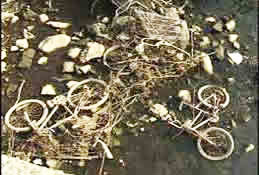
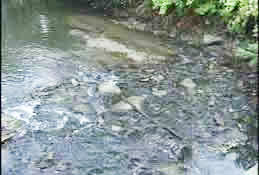
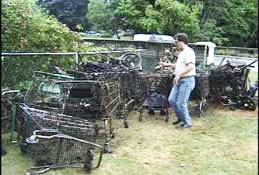
Please join us for our National Rivers Cleanup Week cleanups! There are three cleanups to choose from or attend all three! – organized by the Sheffield Land Trust and Great Barrington Conservation Commission in conjunction with the Housatonic Valley Association and Berkshire Environmental Action Team.
See pictures of the Saturday, June 2nd, River Cleanup and Paddle
Saturday, June 9th – Great Barrington River Cleanup starting at 10 am until about 1pm
Meet at the boat launch on Brookside Road in Great Barrington. (Brookside is off of Route 7 south of the Fairgrounds.) We will not be using boats or canoes, we’ll be on foot and cleaning up along the banks of the river.
Wear old clothes that you don’t mind getting wet and dirty. We will have a few pairs of rubber boots and waders for people to borrow. We will provide garbage bags and thick rubber gloves. If you prefer work gloves, please bring your own – they will get dirty.
Sunday, June 10th – Pittsfield River Cleanup starting at 10am
Meet at Wahconah Park in Pittsfield. We will divide up and cover as many places as we can. We will be cleaning on foot (not by canoe).
Wear old clothes that you don’t mind getting wet and dirty. Rubber boots are good. We will have a few pairs of rubber boots and waders for people to borrow. We will provide garbage bags and thick rubber gloves. If you prefer work gloves, please bring your own – they will get dirty.
From the National Rivers Cleanup Week website: What should volunteers wear?
- High-top work boots with non-skid soles (no tennis shoes)
- Long pants, long sleeve shirt
- Heavy duty leather work gloves
- Hat for sun protection
- Sunscreen
- Insect repellent
(If you only have tennis shoes, you can still pick up trash at the top of the bank or along the road.)
Check our river cleanup page to see what we have done in the past. Cleanups are a lot of hard work and a lot of fun! hope to see you there.
National River Cleanup Week, is presented by American Rivers, and kicks off a series of community-based stream cleanups nationwide beginning the week of June 2-10, 2007. This popular annual event raises public awareness of themagnitude of trash accumulating in our nation¹s waterways. Local volunteerswill be participating along with tens of thousands of volunteers taking part in hundreds of cleanups across the country to remove trash from local rivers and streams.
Rededication Ceremony for Fred Garner Park
On a very chilly day in June, the 6th, a ceremony was held to rededicate Fred Garner Park on Pomeroy Avenue in Pittsfield following the use of the park as a staging area for part of the remediation of two miles of the East Branch of the Housatonic River by the US Environmental Protection Agency (EPA) and General Electric Company (GE). PCBs originally from the GE site in Pittsfield were removed from the river between the GE site and the confluence of the East and West branches of the Housatonic near Fred Garner Park.
Unfortunately, PCBs are still entering the river above and near the beginning of this "cleaned up" part of the river. (see GE and PCBs)
Many people attended the ceremony including Representative Smitty Pignatelli, City Councilors Gerald Lee and Matt Kerwood, member of the EPA, Mass. Department of Environmental Protection (DEP), and river advocates – including two who drove all the way up from Connecticut, Judy Herkimer of the Housatonic Environmental Action League (HEAL) and Lynn Fowler of the Housatonic River Commission.
EPA Regional Administrator Robert Varney spoke as did Pittsfield Mayor James Ruberto and GE’s vice president for environmental programs Stephen Ramsey.
Following the speeches there was a quick ribbon cutting at the start of the canoe launch.
Despite the chill in the air, BEAT’s Executive Director, Jane Winn, and Jenny Hersch, proponent for the Housatonic River Museum, still managed to end the ceremony by launching a canoe and taking a paddle first upstream under the Pomeroy Ave bridge, then down to the confluence of the remediated East Branch and the West Branch. They continued their paddle up the West Branch to explore the oxbow where PCBs had been detected at one time, but never remediated.
Unveiling of the Urban River Visions plan for the West Branch of the Housatonic River
On a somewhat rainy evening at Pitt Park the Urban River Visions plan for the West Branch of the Housatonic River was unveiled.
The evening started with another wonderful performance by Youth Alive
… both step dancing 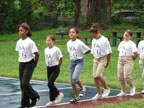 .
. 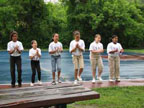 and drumming
and drumming 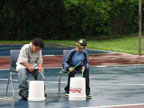 .
. 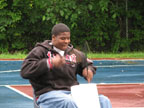
We then moved inside for a presentation of the draft poster resulting from the two-day input session.
(See BEAT’s report and pictures of the two-day input session and the official report [pdf] on the session).
There is more information about the Urban River Visions 2 process on their website.
For more information on the Urban Rivers Vision plan or this event, please contact Jim McGrath, Director of Community Services for Pittsfield, directly at 413-499-9343 or by email.
From: MassLand Weekly E-News
SENATE PASSES BUDGET – NOT SO GOOD FOR ENVIRONMENT
– by Nancy Goodman, Vice President for Policy, Environmental League of
Massachusetts
On Wednesday, the Senate was in session until 9:30 pm considering hundreds of budget amendments. Initially, they took amendments in order and considered them individually. However, just before getting to the environmental amendments, they recessed and when they returned, they voted to adopt a "yes" pile and to deny a "no" pile, which included hundreds of amendments dealing with all agencies. As we waited for the Senators to file out, no one could tell us which of our priorities had been included or not.
Talking with Senators and staff earlier that day, it was clear that the Senate was trying to hold the line on amendments and when the results of their deliberations became available yesterday, the news was not good. They increased the bottom line for environmental agencies by $4.78 million, but many of our priorities were not included. There was no increased funding for state or urban parks although state beaches did see an increase of $2.3 million, matching the House figure. And there was no increased funding for MassGIS or the Natural Heritage Program. (Also, the Natural Heritage & Endangered Species Fund, was not given a waiver of indirect costs charged against it. The amendment sponsored by Senator Resor would have made the administrative waiver permanent. Citizens who make voluntary donations to the program expect their contributions will benefit endangered species recovery, not cover overhead costs.) One interesting note was an amendment that would establish a State Preservation Fund for state owned parks funded by a tax check-off on the state income tax, similar to what now exists for Natural Heritage. The budget will now be considered by a conference committee that will resolve the differences between the House and Senate versions. Once the conferees are appointed, we will be urging them to include the higher numbers for environmental programs.
Other Senate amendments that were adopted:
* DCR foresters saw an increase of $564,000
* DCR administrative account was increased by $542,731.
* EOEEA administrative account increased by $423,672
* $200,000 for Buy Local efforts by the SE Massachusetts Agricultural Partnership
* $100,000 for the Plymouth-Carver aquifer Action Plan
In addition, Senator Tarr introduced an amendment to establish a special commission to study the provisions of Chapter 40A as they relate to the planning and production of housing, economic development and the character of municipalities in the Commonwealth. Chapter 40A is the section of the General Laws that govern zoning and is greatly in need of an overhaul. Several ad hoc groups have been meeting and working on zoning issues and ELM has been involved in this issue for several years. Senator Resor worked with Senator Tarr to revise his amendment to include additional environmental groups on the commission including ELM and Mass Audubon and to make some other changes to the composition of the commission to include environmental viewpoints. It is unclear at this point, how the House will react to this provision in the Senate budget and whether it will survive the conference committee process. We will keep you posted.
Nancy Goodman
Vice President for Policy
Environmental League of Massachusetts
14 Beacon Street, Suite 714
Boston, MA 02144
617-742- 2553
<;http://www.environmentalleague.org>
mailto:[email protected]
[email protected]___
CPA PASSED BY 7 MORE COMMUNITIES
In May the towns of Deerfield, Essex, Goshen, Hudson, Littleton, Phillipston, and Templeton all passed the CPA. (Bolton failed in its first attempt to adopt CPA.) This brings the total number of CPA communities to 127.
____________________________________________________________________
"RANGERS FLOOD STATE HOUSE INSTEAD OF STATE PARKS"
– By Lisa Wangsness, Globe Staff | May 29, 2007
With the unofficial launch of the summer season this past weekend, the state has only five park rangers assigned to the 400,000 acres of parkland outside Greater Boston, but 50 assigned to patrol the State House — a distribution level protected by the Legislature.
"I think a lot of people would expect that park rangers would be out in the parks," said Tad Ames , president of the Berkshire Natural Resources Council , who said October Mountain State Forest in Lee is a law enforcement "no-man’s land," plagued by litter, illicit parties, and the illegal use of off-road vehicles.
Since the Sept. 11, 2001, terrorist attacks, the Legislature has provided hundreds of thousands of additional dollars in order to strengthen security at the 600,000-square-foot State House, increasing the number of rangers from about 30 to its current level. But the number of park rangers patrolling the 156 state parks beyond the metropolitan area has remained steady, at just a handful. Only 17 rangers patrol the 222 heavily used urban parks closer to the city, while 16 guard state watersheds.
"I honestly will tell you, there is nowhere in the state, in my estimation, in the state parks that I know my program is doing an adequate job," said Curt Rudge, Massachusetts‘ chief park ranger. "Without adequate staffing, how can you? It’s just not physically possible."
For the rest of this Boston Globe article, go to:
http://www.boston.com/news/local/articles/2007/05/29/rangers_flood_state_house_instead_of_state_parks?mode=PF
____________________________________________________________________
For the calendar
____________________________________________________________________
NATURAL HERITAGE & ENDANGERED SPECIES, JUNE 14
The Natural Heritage and Endangered Species Advisory Committee will be meeting on Thursday, June 14 at MassWildlife’s Field Headquarters in Westborough at 1:30 PM. The role of the NHES Committee is to provide MassWildlife with independent scientific advice on the conservation and protection of over 400 species of wild plants and animals that are not hunted, fished or trapped.
____________________________________________________________________
MANAGING GRASSLAND & SHRUBLAND, JUNE 23, MONTAGUE
June 23
Managing Grassland and Shrubland Habitat, Turners Falls (Montague)
This "in the field" workshop will feature Jill Liske-Clark, MassWildlife’s Upland Habitat Management Program, who will describe the process of planning and implementing management for grasslands and shrublands at Cass Meadows, part of the Millers River WMA in Athol. Learn about the importance of these habitats to wildlife, how to create them on your property. And what technical and financial resources may be available. Examples of the equipment used for habitat management will be demonstrated. This workshop is part of the Silvio O. Conte National Fish and Wildlife Refuge Landowner Workshop Series arranged in collaboration with Refuge partners. Call 413/863-3221 to register and for more details.
____________________________________________________________________
"TAXES & TRAILS", CHESTER, JUNE 12
You are invited to attend the summer meeting of the Westfield Highlands Forest Partnership on Tuesday, June 12th, in the Chester Train Station. The meeting will focus on "Taxes and Trails" and start with a FREE DINNER at 6 pm. The first half of the meeting will be a panel discussion about the chapter 61 current use program and what recent changes to the law mean for your land and your tax bill. Nathan L’Etoile from the MA Farm Bureau and Linda Swadel from the town of Westborough, both experts on the new chapter 61 changes, will explain the program and changes and answer questions. A third panelist who is a forest landowner has not yet been confirmed. After a short break for dessert, Sara Sheehy from the Appalachian Mountain Club and Randy Toth from the Snowmobile Association of Massachusetts will discuss trails on private land, and address several misconceptions about what it means to have a trail on your land. All are welcome, so please feel free to pass this email or the flier on to others you think might be interested.
The Chester Train Station is just off of Route 20. If you take 20 to downtown Chester, and then turn onto Main Street, you will see the train station in front of you. Turn right at the end of Main Street to curve under the railroad tracks and get to the station. There is parking at the station, on Main Street, and across from Town Hall.
If you have questions about the meeting, please contact me at 413-354-7780 or [email protected].
Laura Marx, Westfield Highlands Forest Partnership
____________________________________________________________________
CARBON OFFSETS & N.E. FORESTS, JUNE 27
Fighting Climate Change with Carbon Offsets:
What is the role of forestland in New England?
Wednesday, June 27, 2007
Augusta Civic Center, Augusta, Maine
For more information and registration, go to:
<;http://www.manometmaine.org>
Organized by:
Manomet Center for Conservation Sciences
Environment Northeast
Maine Forest Service
NEW HANDBOOK DEMYSTIFIES TRANSPORTATION FOR CONSERVATION ADVOCATES
Washington, D.C. – Defenders of Wildlife is proud to present a new book, Getting Up To Speed: A Conservationist’s Guide to Wildlife and Highways. The handbook is written for conservationists to provide the necessary foundation to become better informed, more effective stakeholders in transportation debates.
According to its author and director of Defenders’ Habitat and Highways Campaign, Patricia White, “conservationists are often faced with highway projects that threaten wildlife and habitat, but are ill prepared to respond in an informed manner. For the uninitiated, the world of transportation can be confusing and intimidating. As a result, advocates may feel powerless and ultimately surrender, or expend their limited resources in futile battles. Without a clear understanding of highway planning, policies and procedures, the conservation community cannot make effective changes.”
Harvard University’s Dr. Richard T. T. Forman, author of the seminal book Road Ecology: Science and Solutions, said “GUTS has demystified the world of transportation for you, providing new discoveries at every turn. Conservationists and transportation experts alike will find a goldmine of elucidations and opportunities for new partnerships. Indeed, if you absorb but a tenth of this information, you are a dangerous opponent to the status quo.”
Getting Up To Speed (GUTS) is divided into four sections:
Law, Policy and Governance describes the legislative and regulatory framework associated with our transportation infrastructure, including the highway bill, funding, research and management of roads on public lands.
Anatomy of a Road illustrates the life cycle of a road project, from the planning process to environmental review, through construction and long-term maintenance.
Natural Environment provides greater detail about transportation policies and practices specifically related to wildlife, roadside vegetation and aquatic resources.
Advocacy outlines helpful hints for conservation advocates and showcases some of the best examples of successful organizations and campaigns.
“GUTS is not an anti-road call to arms,” said White. “But conservationists need to understand how highways get built in order to confront the ever-expanding network of public roads that are destroying precious remaining habitat.” The good news, she says, is that we now have the information, technology and policies to turn the corner on this issue if conservationists can get involved, get informed and get up to speed on the opportunities.
Defenders’ Habitat and Highways Campaign, works to reduce the effects of surface transportation on the nation’s wildlife and natural resources by restoring habitat connectivity across existing highways and by preventing future habitat loss to unwise and unnecessary road building.
GUTS is available online at http://www.GettingUpToSpeed.org
Hardcopies are available free of charge to non-profit wildlife conservation advocacy organizations. Government agencies and private companies may purchase hardcopies for $25 each. Please email all questions and inquiries to [email protected]
Defenders of Wildlife is dedicated to the protection of all native wild animals and plants in their natural communities. With more than 900,000 members and activists, Defenders of Wildlife is a leading advocate for innovative solutions to safeguard our wildlife heritage for generations to come. For more information, visit www.defenders.org.
Nature of Learning Grant Program to Support Environmental Education Partnerships
Deadline: June 15
The National Fish and Wildlife Foundation is accepting applications from organizations interested in initiating or
expanding the Nature of Learning program ( http://refuges.fws.gov/generalinterest/education ) in their communities.
The Nature of Learning is a community-based environmental education initiative that seeks to use National Wildlife
Refuges as outdoor classrooms to promote a greater understanding of local conservation issues; encourage an
interdisciplinary approach to learning that seeks to enhance student academic achievement; utilize field experiences and
student-led stewardship projects to connect classroom lessons to real world issues; and involve a partnership among
local schools, community groups, natural resource professionals, and local businesses.
Schools or nonprofit organizations, including "Friends" groups, cooperative and interpretive Associations, Audubon
chapters, etc., are eligible to apply for funding. Programs must involve a partnership among a local school(s), community
group (e.g., Refuge Support Group), and National Wildlife Refuge.
First-year awards are up to $10,000, with up to $1,500 designated for professional development. Existing Nature of
Learning programs are eligible to apply for up to $5,000 to support continued implementation of the program.
Information: <;http://www.nfwf.org/> go to special grants program tabs
www.nfwf.org/AM/Template.cfm?Section=Browse_All_Programs&CONTENTID=5085&TEMPLATE=/CM/ContentDisplay.cfm
SELF-HELP, URBAN S-H AND LWCF GRANTS
From Ian A. Bowles, Secretary, Executive Office of Energy and Environmental Affairs:
"I am pleased to announce that my office, through the Division of Conservation Services (DCS), in anticipation of, and contingent upon, the availability of funds, will conduct the annual Fiscal Year 2008 grant round for the state Self-Help and Urban Self-Help Programs and for the federal Land and Water Conservation Fund Program. The filing deadline for each program is 3 p.m. on Tuesday, July 31, 2007."
Download the application package at:
http://www.mass.gov/envir/dcs/default.htm
Each application package contains both of those files, plus all application materials necessary for conservation and recreation proposals.
Self-Help Program (Conservation Projects)
The Self-Help Program provides funds to municipal conservation commissions for the purchase of conservation land. The priority for this year’s Self-Help grant round will be for the protection of coastal and estuarine property; sensitive stream, river, lake and pond watersheds; and biological conservation (especially rare species habitats). Projects which fall under lands mapped in the Statewide Land Conservation Plan, and those that augment or connect to existing conservation lands, and thereby help to preserve the integrity and health of the local or regional ecosystems, will receive greater consideration for funding.
Urban Self-Help Program (Park Projects)
This year there is a particular focus on getting new parks built in underserved city neighborhoods. Small towns may qualify for these grants where projects are designed to provide statewide or regional recreational facilities or up to a maximum grant of $50,000 for smaller recreational projects.
Questions to Melissa Cryan, Urban Self-Help Coordinator
(617) 626-1171 or [email protected]
Land and Water Conservation Fund Program (LWCF) (Conservation or Park Projects)
This federal grant program funds conservation or park projects submitted from both municipal and state agency project sponsors. The federal program is being announced in anticipation of a congressional appropriation. The federal program is open to the Mass. Dept. of Conservation and Recreation and the Mass. Dept. of Fish and Game. Municipal projects may be considered for funding under both the federal LWCF program and the appropriate DCS program – but can only be approved for funding through one of the programs. Municipalities must indicate on their application that they wish to be eligible for either program.
NPS RIVERS, TRAILS & CONSERVATION ASSISTANCE GRANTS
National Park Service Rivers, Trails & Conservation Assistance Program
Deadline: August 1
If you’re working on restoring a river, building a trail, or making an urban park flourish, they would love to talk with you
about ways you might be able to work together. Could your project benefit from 1-2 years’ staff time and technical
assistance from a National Park Service specialist? They want to help you succeed.
Call today to determine if your project is a good fit.
Information & to Download a program application
<http://www.nps.gov/ncrc/programs/rtca/>
DRINKING WATER SUPPLY PROTECTION GRANTS
FY08 Drinking Water Supply Protection Grant Program
Application Deadline: 3 p.m. Wednesday, September 5th, 2007
The Massachusetts Department of Environmental Protection, in coordination with the Executive Office of Energy and Environmental Affairs, is pleased to issue the FY08 Request for Responses for the 2008 Drinking Water Supply Protection Grant Program.
This grant program provides funding to public water systems and municipalities for land acquisitions that protect public drinking water supplies and drinking water quality. The direct recipient of a grant must be a municipality or public water system authorized by the Commonwealth to provide water to the public. Eligible land acquisitions include land located in existing drinking water supply areas. Land may be acquired through purchase of fee simple title, purchase of a conservation restriction, or purchase of a combination of fee simple title and conservation restriction(s).
The maximum grant award for a single project is $500,000. The maximum reimbursement amount available is 50% of the total project cost. This Request for Responses is being issued in anticipation of the availability of funding. Final grant awards are continent upon funding. There is no guarantee that monies will be awarded. Multiple contracts may be awarded by MassDEP.
Qualified applications will be selected on a competitive basis. We look forward to receiving your applications. Applications must be submitted no later than Wednesday, September 5, 2007 at 3:00 p.m.
The complete Drinking Water Supply Protection Request for Responses (RFR) is now available on the Comm-PASS website: https://www.comm-pass.com/ Directions for negotiating the site are included below.
DEP and EOEEA will hold two informational grant workshops:
Thursday, June 7, from 3:00 pm – 4:45 pm
MA Dept. of Public Health Western Regional Office, Northampton
Directions:
http://www.mass.gov/dph/about/directions/wrhodir.htm
Thursday, June 14, from 1:00 pm – 3:00 pm
MA Dept. of Environmental Protection Main Office, Boston
Directions:
http://www.mass.gov/dep/about/organization/depdir.htm
Questions? Contact Christy Edwards (EOEEA) via email at [email protected]
FY08 Drinking Water Supply Protection Grant Comm-PASS Instructions:
1.) On the Comm-PASS home page (http://www.comm-pass.com/) select the “Solicitations” tab at the top-left of the page.
2.) Select “Search for a Solicitation”.
3.) In the "Search by Specific Criteria" section enter “BRP 2007-03” in the Document Number field.
4.) This search will yield one result. Click on the sentence on the top of the page that says: "There are 1 Solicitation(s) found that match your search criteria".
5.) Select the spectacle icon on the far right-hand column to view all information available for this grant program.
6.) Click on the tab that says "Specifications" to view the grant Request for Response. Answers to questions and amendments to the original RFR (if necessary) will also be posted here. Click on the spectacle icon to view and print any document posted in this section.
Berkshire County River Cleanups 6/9 & 10
2005 Pittsfield West Branch of the Housatonic River Cleanup



Please join us for our National Rivers Cleanup Week cleanups! There are three cleanups to choose from or attend all three! – organized by the Sheffield Land Trust and Great Barrington Conservation Commission in conjunction with the Housatonic Valley Association and Berkshire Environmental Action Team.
See pictures of the Saturday, June 2nd, River Cleanup and Paddle
Saturday, June 9th – Great Barrington River Cleanup starting at 10 am until about 1pm
Meet at the boat launch on Brookside Road in Great Barrington. (Brookside is off of Route 7 south of the Fairgrounds.) We will not be using boats or canoes, we’ll be on foot and cleaning up along the banks of the river.
Wear old clothes that you don’t mind getting wet and dirty. We will have a few pairs of rubber boots and waders for people to borrow. We will provide garbage bags and thick rubber gloves. If you prefer work gloves, please bring your own – they will get dirty.
Sunday, June 10th – Pittsfield River Cleanup starting at 10am
Meet at Wahconah Park in Pittsfield. We will divide up and cover as many places as we can. We will be cleaning on foot (not by canoe).
Wear old clothes that you don’t mind getting wet and dirty. Rubber boots are good. We will have a few pairs of rubber boots and waders for people to borrow. We will provide garbage bags and thick rubber gloves. If you prefer work gloves, please bring your own – they will get dirty.
From the National Rivers Cleanup Week website: What should volunteers wear?
- High-top work boots with non-skid soles (no tennis shoes)
- Long pants, long sleeve shirt
- Heavy duty leather work gloves
- Hat for sun protection
- Sunscreen
- Insect repellent
(If you only have tennis shoes, you can still pick up trash at the top of the bank or along the road.)
Check our river cleanup page to see what we have done in the past. Cleanups are a lot of hard work and a lot of fun! hope to see you there.
National River Cleanup Week, is presented by American Rivers, and kicks off a series of community-based stream cleanups nationwide beginning the week of June 2-10, 2007. This popular annual event raises public awareness of themagnitude of trash accumulating in our nation¹s waterways. Local volunteerswill be participating along with tens of thousands of volunteers taking part in hundreds of cleanups across the country to remove trash from local rivers and streams.
Rededication Ceremony for Fred Garner Park
On a very chilly day in June, the 6th, a ceremony was held to rededicate Fred Garner Park on Pomeroy Avenue in Pittsfield following the use of the park as a staging area for part of the remediation of two miles of the East Branch of the Housatonic River by the US Environmental Protection Agency (EPA) and General Electric Company (GE). PCBs originally from the GE site in Pittsfield were removed from the river between the GE site and the confluence of the East and West branches of the Housatonic near Fred Garner Park.
Unfortunately, PCBs are still entering the river above and near the beginning of this "cleaned up" part of the river. (see GE and PCBs)
Many people attended the ceremony including Representative Smitty Pignatelli, City Councilors Gerald Lee and Matt Kerwood, member of the EPA, Mass. Department of Environmental Protection (DEP), and river advocates – including two who drove all the way up from Connecticut, Judy Herkimer of the Housatonic Environmental Action League (HEAL) and Lynn Fowler of the Housatonic River Commission.
EPA Regional Administrator Robert Varney spoke as did Pittsfield Mayor James Ruberto and GE’s vice president for environmental programs Stephen Ramsey.
Following the speeches there was a quick ribbon cutting at the start of the canoe launch.
Despite the chill in the air, BEAT’s Executive Director, Jane Winn, and Jenny Hersch, proponent for the Housatonic River Museum, still managed to end the ceremony by launching a canoe and taking a paddle first upstream under the Pomeroy Ave bridge, then down to the confluence of the remediated East Branch and the West Branch. They continued their paddle up the West Branch to explore the oxbow where PCBs had been detected at one time, but never remediated.
Unveiling of the Urban River Visions plan for the West Branch of the Housatonic River
On a somewhat rainy evening at Pitt Park the Urban River Visions plan for the West Branch of the Housatonic River was unveiled.
The evening started with another wonderful performance by Youth Alive
… both step dancing  .
.  and drumming
and drumming  .
. 
We then moved inside for a presentation of the draft poster resulting from the two-day input session.
(See BEAT’s report and pictures of the two-day input session and the official report [pdf] on the session).
There is more information about the Urban River Visions 2 process on their website.
For more information on the Urban Rivers Vision plan or this event, please contact Jim McGrath, Director of Community Services for Pittsfield, directly at 413-499-9343 or by email.
Philip Giudice New State Commissioner of Energy Resources
Governor Deval Patrick named a Boston energy executive, Philip Giudice , as commissioner of the state Division of Energy Resources starting next month. Giudice, 51, of Wayland, is senior vice president and director of Enernoc Inc., a start-up Boston company that manages "demand response" programs for power grid operators in New England and other parts of the United States through which businesses and institutions are paid monthly fees in exchange for being willing to suddenly shut down lighting, air conditioning, or industrial operations or switch to their own generators during periods of peak grid power demand. Giudice also is chairman of the Center for Effective Philanthropy in Cambridge and spent 18 years as an energy consultant at Mercer Management Consulting in Lexington.
Giudice said promoting energy efficiency will be a key focus, especially given that saving a unit of electricity can cost just half as much as producing the same unit.
SIERRA CLUB JOB OPENING FULL-TIME, GRANT-DEPENDENT, REGULAR SALARY: CATEGORY 04- $43,000+/YR COMMENSURATE W/ SKILLS AND EXPERIENCE PLUS BENEFITS Job Date: 03/01 Job No.: R1045 Category: 04 Union: Non-Rep FLSA: Exempt FTE: 1.0 SIERRA CLUB JOB DESCRIPTION Job Title: Regional Representative - Manager Department: Conservation/NE region Boston, Mass Reports To: North East Regional Staff Director Supervises: Maine Woods campaign, NH Field staff, RI field staff Context: Plans, organizes, and coordinates the activities of staff and volunteers in carrying out the activities for assigned campaigns and programs in the region. Participates in the development of strategies, priorities and fundraising. Scope: The Regional Representative - Manager is responsible for the coordination of one or more conservation campaigns within the region. Supervises one or more field employees. Participates in the strategies and helps to carry out, organizational and issue visibility in regional, national media and in the local community. Participates in activities and services provided by the regional office. Works in close cooperation with volunteer leaders, national, state, and local conservation staff on conservation campaigns. Job Activities: 1. Supervises, directs, develops, and provides general and technical guidance to staff which includes the following: a)assigning work and establishing standards and work priorities b)ensuring staff training and development of employee skills c)providing ongoing performance feedback, preparing and conducting performance planning and evaluation d)effectively recommending salary, hiring, promotion and disciplinary action. 2. Develops strategy, marshals grassroots organizing resources, organizes staff and volunteer efforts, helps raise funds, monitors and tracks expenses on select campaigns. 3. Plans and coordinates grassroots strategy and activities to obtain media coverage in regional and national media outlets. Participates in the development of media campaigns; may represent the Sierra Club in the media; promotes volunteer media exposure. 4. Lobbies members of Congress and other public officials on behalf of the Club on national and regional conservation priorities. Develops relationships with Congressional members and staff within the region. 5. Coordinates grassroots campaign organizing in public education, Congressional and other electoral campaigns; serves as liaison between Sierra Club and leadership of political parties and other political entities. 6. Represents the Sierra Club in regional coalitions, at regional events, and to the general public. 7. Supports and provides professional assistance to volunteer conservation activities within the region. 8. In cooperation with fundraising staff, assists in the development of funding proposals and participates in grant making and solicitation efforts. 9. Helps train and motivate volunteers. Participates in volunteer meetings and events as needed. 10. Performs miscellaneous duties as assigned. Seasonal Activities: Heavier seasonal workloads may occur as a result of project deadlines, staff absences and vacancies, and during peak activity periods. Frequent weekend and/or evening work required. Knowledge & Skills: -- BA/BS degree in Environmental Studies, Political Science or closely related field. -- At least 3 years experience in grassroots organizing, training, and motivating volunteers, coalition building and lobbying. -- Valid driver¹s license, satisfactory driving record, and proof of auto insurance required. -- Strong demonstrated written and oral communication skills. Demonstrated public speaking ability. -- Excellent knowledge and background in specific issue area of the environmental field related to assigned programs and campaigns. -- Prior experience and knowledge of the legislative process. -- Demonstrated ability and effectiveness working with volunteers. Sierra Club is an equal opportunity employer committed to a diverse workforce. Explore, enjoy and protect the planet. James Bryan McCaffrey Director Massachusetts Sierra Club 100 Boylston St. Boston MA 02116 617.423.5775 voice 617.423.5858 fax www.sierraclubmass.org [email protected] The Sierra Club is a non-profit environmental organization with 27,000 members in Massachusetts and 700,000 members nationwide dedicated to the preservation, protection, and exploration of the earth¹s natural environment. Join us! www.sierraclubmass.org
Joint Committee on the Environment, Natural Resources, and Agriculture 2007-2008 Hearing Schedule. This schedule is subject to change. For questions please contact the Committee at (617) 722-2210
All hearings in State House Hearing Room A-1 unless otherwise noted
Air and Water Quality – June 25, 2007 – 1:00 PM
Agriculture and Milk – July 9, 2007 – 1:00 PM – Location TBA
Oceans – July 16, 2007 – 1:00 PM – Location TBA
Oceans and Waterways – July 23, 2007 – 1:00 PM – Location New Bedford
LAND CONSERVATION – July 30, 2007 – 1:00 PM – Location TBA
Pesticides & Hazardous Waste – September 10, 2007 – 1:00 PM
Fish and Game – September 17, 2007 – 1:00 PM
Policies – September 24, 2007 – 1:00 PM
Dept. of Conservation & Recreation (DCR) – October 1, 2007 – 1:00 PM
Sewers, Title V, Wetlands – October 15, 2007 – 1:00 PM
Miscellaneous – October 22, 2007 – 1:00 PM

